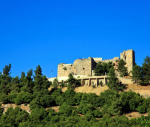You are here
'Green cover increases by 15,000 dunums in three years'
By Hana Namrouqa - Jan 10,2016 - Last updated at Jan 10,2016

The Dibbeen Forest Reserve located in Jerash Governorate (Photo courtesy of RSCN)
AMMAN — The Kingdom's green cover increased by 15,000 dunums over the past three years, while violations on the country's forests dropped by more than half during the same period, according to the Forestry Department.
Ongoing projects to plant more trees coupled with intensified monitoring of forests to prevent illegal logging contributed to the increase in the country's green cover, Eid Zu'bi, director of the Agriculture Ministry's Forestry Department, said on Sunday.
"Between 2013 and 2015, forest trees were planted on 15,000 dunums. And this year, there are plans to plant trees on another 4,000-5,000 dunums," Zu'bi told The Jordan Times.
To mark Arbour Day, celebrated annually on January 15, the ministry will plant 25,000 saplings across the Kingdom starting Thursday to further expand Jordan’s forests, he added.
"On Thursday alone, some 500 dunums of bare lands will be planted with thousands of saplings. The main celebration will take place in Karak Governorate," Zu'bi noted.
In addition, the ministry has plans to have 12,000 dunums covered with trees in Karak's Sneiniyeh area by next year, according to the official.
"Under a separate initiative, trees were planted on some 8,000 dunums of land in Karak over the past three years. The project is scheduled to end by next year, when 12,000 dunums should be covered with different forest trees," Eid highlighted.
During this time every year, the ministry’s forestry department plants saplings on hundreds of dunums to expand the Kingdom’s green cover.
The forestry department’s 14 nurseries across the country, which produce 3 million saplings of more than 80 different kinds every year, will provide the trees, according to the ministry.
The department annually distributes over 1.5 million saplings to the public free of charge, in addition to some 500,000 saplings to public and private institutions. Another 1 million saplings are left at the nurseries to produce more, according to the ministry.
The tradition of Arbour Day in the Kingdom began in 1939 with a ceremony held in the Jabal Al Qalaa neighbourhood.
Since then, it has been an annual celebration, with the Agriculture Ministry choosing a different location each year to plant various saplings.
Illegal logging during winter, wildfires in summer and insufficient rain due to climate change are the main threats to Jordan’s shrinking green cover, which stands at less than 1 per cent of the country’s total landscape, according to experts.
Forestry lands amount to 1.5 million dunums, of which 250,000 dunums are bare, 400,000 dunums are natural forests, 500,000 dunums are planted forests and 350,000 are nature reserves, the ministry has said.
Jordan is among the poorest countries worldwide in terms of green cover, with the internationally accepted average of land covered by forests at 15 per cent of the total area.
















